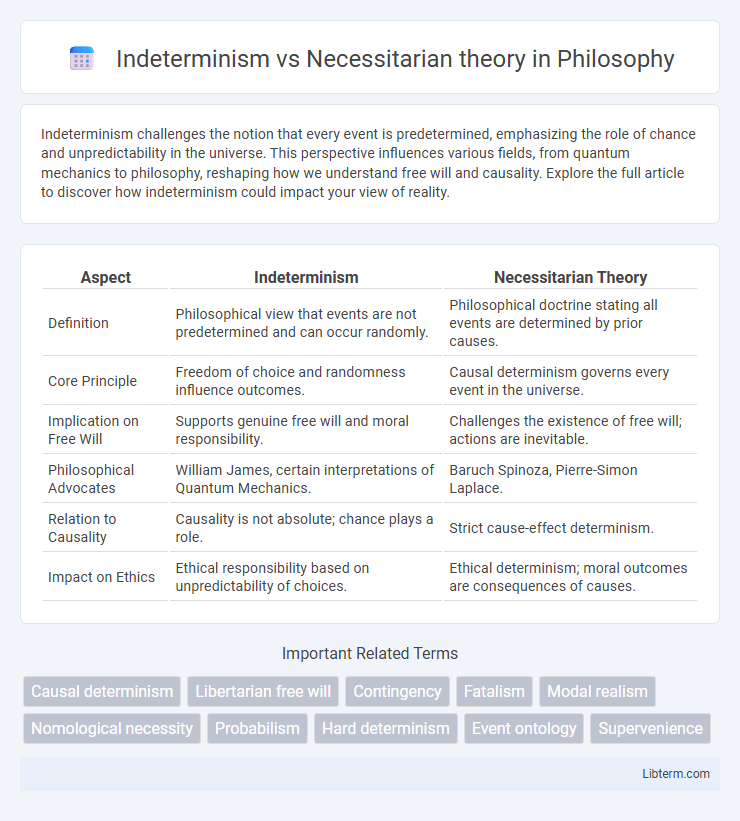Indeterminism challenges the notion that every event is predetermined, emphasizing the role of chance and unpredictability in the universe. This perspective influences various fields, from quantum mechanics to philosophy, reshaping how we understand free will and causality. Explore the full article to discover how indeterminism could impact your view of reality.
Table of Comparison
| Aspect | Indeterminism | Necessitarian Theory |
|---|---|---|
| Definition | Philosophical view that events are not predetermined and can occur randomly. | Philosophical doctrine stating all events are determined by prior causes. |
| Core Principle | Freedom of choice and randomness influence outcomes. | Causal determinism governs every event in the universe. |
| Implication on Free Will | Supports genuine free will and moral responsibility. | Challenges the existence of free will; actions are inevitable. |
| Philosophical Advocates | William James, certain interpretations of Quantum Mechanics. | Baruch Spinoza, Pierre-Simon Laplace. |
| Relation to Causality | Causality is not absolute; chance plays a role. | Strict cause-effect determinism. |
| Impact on Ethics | Ethical responsibility based on unpredictability of choices. | Ethical determinism; moral outcomes are consequences of causes. |
Understanding Indeterminism: Definition and Principles
Indeterminism posits that not all events are causally determined by previous occurrences, allowing for genuine randomness and unpredictability in the universe. This theory challenges strict causal determinism by asserting that some events result from factors that are not predetermined, emphasizing freedom and chance in natural processes. Key principles include the rejection of causal necessity and the acceptance of probabilistic or stochastic elements within physical and metaphysical frameworks.
Necessitarianism Explained: Core Concepts
Necessitarianism posits that every event and state of affairs is the consequence of preceding causes governed by strict laws of nature, making all occurrences inevitable and predetermined. This theory asserts that given the same initial conditions, only one possible future can unfold, emphasizing causal determinism and rejecting the existence of genuine alternative possibilities. In philosophical discourse, necessitarianism challenges indeterminism by insisting on the necessity of all events, framing freedom and chance as illusions within a causally closed system.
Historical Roots of Indeterminism and Necessitarian Theory
Indeterminism traces its historical roots to early quantum mechanics and philosophers like William James, emphasizing the role of chance and unpredictability in natural events. Necessitarian theory, rooted in classical determinism and Aristotle's metaphysics, asserts that every event follows inevitably from preceding causes and universal laws. The debate between these theories reflects contrasting views on causality, with indeterminism highlighting randomness and necessitarianism insisting on strict causal necessity.
Key Philosophers in the Debate
Indeterminism is championed by philosophers like William James and Bertrand Russell, who argue that human actions are not causally predetermined and emphasize the role of free will and chance in the universe. Necessitarian theory finds its roots in the works of Baruch Spinoza and determinists like Pierre-Simon Laplace, positing that every event follows inevitably from preceding causes under universal laws. This debate centers on whether reality is governed by strict causal necessity or includes inherent randomness and freedom.
Comparing Indeterminism and Necessitarianism
Indeterminism asserts that not all events are causally determined, allowing for randomness and alternative possibilities in the flow of events, whereas Necessitarianism claims that every event is necessitated by preceding causes, leaving no room for genuine alternative outcomes. Indeterminism emphasizes free will and unpredictability, contrasting with Necessitarianism's strict causal determinism that upholds a fixed and inevitable sequence of events. These opposing metaphysical views shape debates in philosophy of mind, ethics, and quantum mechanics by addressing the nature of causality and human freedom.
Implications for Free Will and Moral Responsibility
Indeterminism asserts that events, including human actions, are not predetermined, allowing for genuine free will and thus supporting moral responsibility by emphasizing the role of choice and unpredictability. Necessitarian theory, claiming that all events follow causal laws without deviation, challenges traditional notions of free will by suggesting that actions are predetermined, potentially undermining moral accountability. The debate impacts how philosophers and legal systems assign blame or praise, as indeterminism upholds autonomous decision-making while necessitarianism calls for reevaluating moral responsibility within a deterministic framework.
Indeterminism in Science and Quantum Mechanics
Indeterminism in science, particularly in quantum mechanics, highlights the fundamental unpredictability of particle behavior at the subatomic level, where outcomes cannot be precisely determined but are described by probability distributions. This contrasts with necessitarian theory, which posits that all events are causally determined by prior states, implying a deterministic universe. Quantum phenomena such as wavefunction collapse and Heisenberg's uncertainty principle exemplify how indeterminism challenges classical deterministic interpretations.
Necessitarianism in Metaphysics and Ethics
Necessitarianism in metaphysics asserts that all events and states of affairs are determined by prior causes or necessary laws, denying the existence of genuine contingency or alternative possibilities. In ethics, necessitarian theory implies that moral actions and decisions are constrained by predetermined principles or natural laws, often leading to a deterministic view of human responsibility. This perspective influences debates on free will, moral accountability, and the nature of necessity in human conduct.
Criticisms and Counterarguments for Both Theories
Indeterminism faces criticism for potentially undermining causal coherence and predictability, challenging scientific explanations based on consistent cause-effect relationships. Necessitarian theory is criticized for negating free will and moral responsibility by asserting that all events are predetermined, which some argue conflicts with human experience and ethical accountability. Counterarguments for indeterminism emphasize quantum mechanics and randomness in nature, while defenders of necessitarianism highlight the logical consistency and explanatory power of a fully determined universe.
The Ongoing Relevance of the Debate Today
The debate between Indeterminism and Necessitarian theory remains crucial in contemporary philosophy of science and metaphysics, influencing discussions on free will, causality, and predictability. Indeterminism supports the notion that events are not predetermined, aligning with quantum mechanics and theories emphasizing probabilistic outcomes, while Necessitarian theory asserts that every event follows necessarily from prior conditions under deterministic laws. This ongoing discourse impacts ethical considerations, artificial intelligence development, and scientific modeling, highlighting the persistent tension between randomness and determinism in understanding reality.
Indeterminism Infographic

 libterm.com
libterm.com